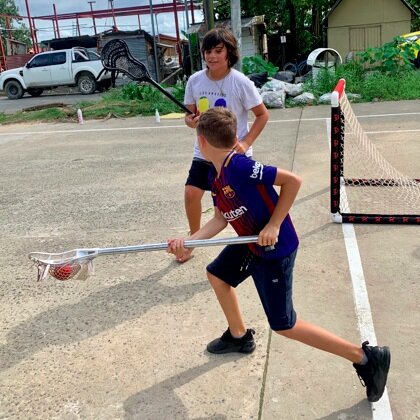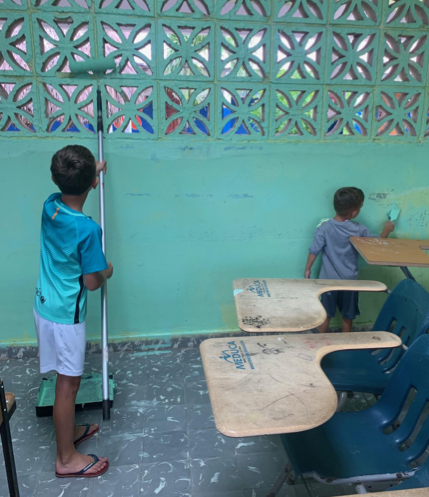Our programs strive to be inclusive platforms for kids of various ages, backgrounds and abilities to allow them grow together. By unifying communities through the love of lacrosse, our practices allow youth to learn from each other and work towards common goals.
In Bocas del Toro, gender, age, skin color and even language are not hindrances for our players! This past Fall, with the addition of Camil and Vadim, our afternoon practice on Isla Colon reflected the epitome of inclusivity and variety by adding French into the language mix.
(Left to right) Camil, Vadim, Adolfo, Brillan, and Denis post-practice.
Camil, age 9, and his younger brother Vadim, age 5, were biking by our practice one sunny afternoon in September with their parents. Never having seen lacrosse before, the family immediately stopped their leisure ride and watched us play. They were on a two-month holiday away from their home in France and they were fascinated by this strange sport.
Since our programs are open to all children willing and wanting to play, I naturally invited them over and asked if they would like to join in (luckily I studied French in college and previously worked in Paris) Although Camil stayed silent by his mother’s side and Vadim hid behind his father, both parents expressed that they were eager to stay and watch. I laid a few sticks at their feet in case they wanted to try it out, and then returned to running practice.
Camil diving head into 1v1’s vs teammate, Silas.
Soon enough, Camil and Vadim were passing back and forth on the side of the court with their parents. For the next two months, Camil and Vadim became consistent players at our practices.
Camil, who was taking Spanish classes while in Bocas, communicated with the other players to the best of his ability. Little Vadim - arguably the youngest player on the field - communicated with his teammates via his brother and endless smiles. Adding to this awesomeness was Bocas veteran players, Silas and Xia, trilingual French speakers who helped explain all of the drills and rules to Camil and Vadim.
Before my eyes, our practices now involved three different languages - Spanish, English and French - and all of our players became exposed to a new environment. The best part? Lacrosse made this possible.
Camil and Vadim helping paint in Bocas Middle School.
As time went by and Camil and Vadim became “regulars,” they even joined in with our local Bocas players to help paint classrooms at the community’s middle school. We had an absolute blast learning from each other and trying to understand one another without having our brains implode from a swirl of languages.
By the end of their vacation, the French family had become part of our Bocas family. As an act of camaraderie and gratitude, Camil gifted his bike to his teammate Brillan before he left. He knew that Brillan didn’t have one of his own and that it would enable him to get around the island much more easily. Today, you can still catch Brillan speeding around town on Camil’s bike wearing a huge smile.
Thank you Camil and Vadim for being brave and joining our program. We hope you come back to visit Bocas again!
Camil, Brillan, and Brillan’s brother, Denis post-practice (ft. Camil’s bike)













